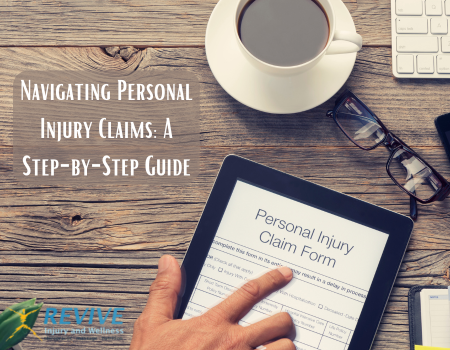
Suffering a personal injury can be a life-altering experience, often bringing physical, emotional, and financial burdens. Knowing the right steps to take during the claims process can significantly increase your chances of securing the compensation you deserve for your injuries and losses. This guide provides a step-by-step approach to handling personal injury claims effectively.
Step 1: Prioritize Your Health
The first and most important step after sustaining an injury is seeking medical attention. Even if your injuries seem minor, consulting a healthcare professional ensures proper treatment and provides essential medical records that serve as evidence in your claim. Delaying medical care can not only harm your health but also weaken your case, as insurers may argue that your injuries were not severe or were unrelated to the incident.
Step 2: Document Everything
Proper documentation plays an important role when building a strong case. Collect as much evidence as you can, including:
- Photos of the accident scene, injuries, and property damage
- Witness statements and contact details
- Medical reports and treatment records
- Police or incident reports (if applicable)
- Any communication with the party at fault, or their insurance company
Keeping a personal journal detailing how your injuries affect your daily life, work, and overall well-being can also help substantiate your claim.
Step 3: Report the Incident
Depending on the nature of your injury, you may need to report the incident to the appropriate authorities. For injuries that take place in the workplace, let your employer know, and file an official report. If the injury was caused by a car accident, contact the police and request a report. If it occurred in a public or private establishment, inform the property owner or manager. Having an official record strengthens your claim and helps prevent disputes.
Step 4: Consult a Personal Injury Lawyer
While you can file a claim on your own, working with a personal injury lawyer increases your chances of securing fair compensation. An experienced attorney can assess your case, negotiate with insurance companies, and represent you in court if necessary.
Step 5: Notify the Insurance Company
Once you have gathered initial evidence, inform the relevant insurance company about the incident. Be cautious when speaking with insurance adjusters, as they may try to minimize your claim. Provide only necessary details and avoid giving recorded statements without consulting your lawyer. Your attorney can handle communications to ensure your rights are protected.
Step 6: Assess Your Damages
A personal injury claim extends beyond medical expenses. It should account for various losses, including:
- Current and future medical expenses
- Lost wages due to missed work
- Pain and suffering
- Emotional distress
- Property damage (if applicable)
Properly calculating your damages ensures that you seek adequate compensation for your losses.
Step 7: Negotiate a Settlement
The majority of personal injury cases are settled outside of court rather than going to trial. While insurance companies may propose a settlement, it is often less than what you are entitled to. Your lawyer will advocate for you, negotiating to secure a fair and just compensation. If a satisfactory settlement is reached, you will sign a release form stating that you will not pursue further claims related to the incident.
Step 8: Consider Legal Action
If negotiations fail and the insurance company refuses to offer fair compensation, filing a lawsuit may be the next step. The legal process involves:
- Filing a formal complaint in court
- Discovery, where both sides exchange evidence
- Possible mediation or settlement discussions
- A trial, if no agreement is reached
While lawsuits take time, they may be necessary to secure the compensation you deserve.
Step 9: Receive Compensation
Whether you reach a settlement or win in court, you will be awarded compensation for your damages. This payment may come as a lump sum or structured settlement. If your case involved legal fees, medical liens, or outstanding expenses, these may be deducted from the final payout.
Navigating a personal injury claim can be complex, but taking the right steps can improve your chances of receiving fair compensation. Prioritizing your health, gathering strong evidence, consulting a lawyer, and negotiating wisely can help you achieve the best possible outcome. Understanding your rights and being proactive throughout the process will ensure that you are not taken advantage of by insurance companies or liable parties.


